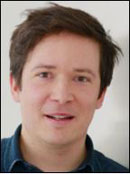Awardee Interviews | Biography: Markus Valtiner
Markus Valtiner

Markus Valtiner, Technical University Bergakademie Freiberg, Germany, “for advancing understanding of physical and chemical mechanisms at molecular, nano- and microscales that impact adhesion and friction at electrified interfaces and for the development of novel stimuli-responsive materials.”
Dr. Markus Valtiner is Full-Professor in the Chemistry and Physics Department at the Freiberg University for Mining and Technology in Freiberg, Germany. Markus received his Master with Distinction in Applied Chemistry from Vienna University of Technology in Austria in 2005. In 2008 he earned his Doctorate in Chemistry at the Max-Planck-Institut für Eisenforschung GmbH in Düsseldorf, Germany under the supervision of Prof. Guido Grundmeier and Prof. Jörg Neugebauer. This thesis work focused on correlating theory and experiment at reactive solid|liquid interfaces of ZnO single crystals. In particular, Markus studied the dissolution mechanism of ZnO(0001) using in-situ scanning probe microscopy, and simulated ZnO surface and interface structures using ab inito thermodynamics. For his PhD thesis he received the Otto Hahn Medal of the Max-Planck Society.
After completing his PhD with highest distinctions, Markus was awarded a Marie-Curie Outgoing Fellowship by the European Union to work as a PostDoc in the group of Jacob Israelachvili at UC Santa Barbara. During this time, his research interest focused on electrochemical interfaces and together with Jacob he pioneered the development an electrochemical surface forces apparatus (SFA) with welldefined metal surfaces for probing solid/electrolyte interface structuring in electrochemical systems. During his time at UCSB Markus also became interested in biological interfaces, smart and responsive materials, as well as molecular interactions at solid/liquid interfaces. In particular, he studied interaction forces of macroscopic hydrophobic surfaces with polymer molecules, as well as mussel-protein based glues.
After completing his PostDoc in 2012, Markus started his independent career as a research group leader at the Max-Planck Institute in Düsseldorf. In 2016 he was appointed full professor for Colloid and Interface Science at the Freiberg University for Mining and Technology. Markus research interest is now focused on the broad areas of adhesion, friction, corrosion as well as interfacial forces in biologic and inorganic materials systems. In particular, he is interested in the experimental characterization and modelling of interactions of single molecules with solid surfaces in various electrolytes. He uses AFM force spectroscopy to directly probe how various single molecules bind to well-defined surfaces, and he correlates this experimental single molecule data with simulation data. This work made substantial progress towards a detailed understanding of molecular interactions and non-equilibrium processes at hydrated model interfaces, bridging UHV based surface science with colloid and interface science. His work on single molecule surface interactions earned him an ERC starting grant in 2015 and several national research grants in Germany. Markus served as a program committee member as well as organizer for numerous conferences, and as guest editor for the journal Biointerphases. He has authored or coauthored over 50 peer-reviewed publications.